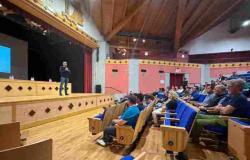
With the polls closed and the counting concluded, the protagonists of any electoral competition seem to all profess to be winners, or almost so. The day after the European vote last Saturday and Sunday is no exception. But who really wins and loses? A precious magnifying glass is offered by the geographical analysis of the vote in the city.
De Luca’s primacy
“Libertà” by Cateno De Luca won in 222 out of 253 sections. A figure that reinforces the primacy of the former mayor’s political creature in what, however, was already a “conquered” fiefdom. This is why, within the party, if on the one hand there is satisfaction at having obtained an excellent local result, considering it a sign of approval towards the actions of the Basile administration, on the other there are those who are convinced that between two weeks, when De Luca returns from his “retreat” of rest (and reflections) in Fiumedinisi, there will still be a discussion about what has been done and how much there is to do. South calls North has held where it was already strong, but has not made the leap in quality outside the confines of its own “comfort zone” and there are those who think that from the army of associations, small parties and sensitivities coming from the most disparate worlds ( from the anti-vaxxers to the street vendors, from the anti-Europeanists to the bulwarks of the elusive traditional family) the added value hoped for on the eve has not arrived. In fact, perhaps the effect was the opposite. The percentage drop at a regional level, then, is worrying in terms of the future, because if the “real” game remains the one to get to Palazzo d’Orleans, today the road is certainly more uphill than yesterday, even though De Luca remains the interlocutor forced into a logic of credible opposition to the centre-right. Even more so after the success of Forza Italia.
PD: smiles and friction
And the others? How are they doing? Although the second party in the city turned out to be the Brothers of Italy, it is the Democratic Party that has brought home the highest number of sections after “Libertà”: 12, of which 6 right “under De Luca’s house”, at the Mazzini school in via Oratorio San Francesco, two doors down from the political headquarters of South calls North in the city. The Democratic Party also won in one section at Tommaseo, in two at Pascoli and at Santa Eustochia, and in one at Boer. A party which, on the eve of the key phase of the provincial congress, appears healthier than a couple of years ago, but not without dark sides. The excellent result of Maria Flavia Timbro, the third most voted Messina native after De Luca and Antoci, did not extinguish some internal discontent. One fact has made many people frown in the last few hours: the victory of Giuseppe Lupo from Palermo in 35 sections. In some with significant numbers: in Tremestieri-Larderia Lupo exceeded 40 votes, Timbro did not reach 20. In section 55 even 17-0. Data will cause discussion. Especially if you consider that, in the Messina area, the Democratic Party obtained the lowest percentage among the Sicilian provinces.
The “betrayal” in the League
Something similar happened in the League, where the “host” Nino Germanà fell below expectations, not reaching 3 thousand votes, and above all was beaten by Raffaele Stancanelli in 38 sections. Especially in the southern area, many preferred the MEP from Catania (the only one elected in Sicily from the Northern League) to the senator from Messina. An even more evident “betrayal” in some sections, including the 30 of Zafferia (38 Stancanelli votes, zero Germanà) and, above all, the 232 of San Filippo Superiore, one of the three sections in which the League won (the others are to Mili Marina and Curcuraci): here Stancanelli came out first with 82 votes, second with Roberto Vannacci with 56, Germanà far behind with just 6 votes. It cannot be said that these signals sent to the senator were not announced: some Northern League members from Messina (above all the councilor Mirko Cantello) had openly declared their support for Stancanelli, a break sanctioned after the task entrusted by the regional group of the League to the municipal councilor Cosimo Oteri (former Forzista, now at the Misto group) and which apparently led to Cantello’s failure to be invited to the gala dinner with Salvini. A rupture, probably not isolated. How can we fail to notice, in fact, that San Filippo Superiore is the electoral “homeland” of another Northern League councilor, Giuseppe Villari.
Brothers and Forzisti of Italy
There is a derby for the leadership of the centre-right in the city, and it is the one between Fratelli d’Italia and Forza Italia. But the analysis of the vote must take into account some factors. The Melonians have conquered 8 sections in the city (in Aldisio village, Lower Camaro, Tommaseo, Mazzini Gallo, Orto Liuzzo, two in Albino Luciani and the mini-section of the Polyclinic) and while on the one hand the weight is not in question by Elvira Amata, on the other hand the drag effect generated by Prime Minister Giorgia Meloni is evident, who obtained three thousand more preferences (many with a “dry” vote) than the regional councilor herself.
Forza Italia won 7 sections (Mili San Marco, Bisconte, Ritiro, Massa Santa Lucia and Massa San Giorgio, two in Aldisio), but here the analysis is even more complex, because the origin of the votes is complex and varied which led to the success of this round (close to 13% in the city). The regional coordinator Bernardette Grasso did very well, well over 3 thousand votes. But the 5 thousand added by Caterina Chinnici and Michele Cossa stand out, the former supported by the Genovese family (alias Raffaele Lombardo, therefore outside the party), the latter, coupled with Grasso, by the group led by the lawyer Salvatore Silvestro, for a signal precise everything internal to the Forza fans. Moreover, it is not usual for a Sardinian candidate, Cossa from Cagliari, to bring home 2,188 preferences in Messina, even coming first or second in the party in some sections (see Villaggio Aldisio).
The crisis of the pentastellates
The decline of the 5 Star Movement continues, inexorable. And it is paradoxical, if you consider that the only person from Messina elected for Strasbourg in this round is the leader of the Five Star Movement, Giuseppe Antoci. The Movement did not win in any section and, in general, closed the match with a less than exciting 11.39%. As for the Democratic Party, also for the M5S the figure for Messina (10.31%) is the worst among all the Sicilian provinces. And, returning to the capital, it goes hand in hand with the flop in the local elections two years ago, when the M5S, as the first party in 2018, found itself out of the city council.
The others (and some curiosities)
A look at the other forces. Alleanza Verdi Sinistra did well, reaching an excellent 5% in the city. In one section she even came second, behind De Luca. And perhaps it is no coincidence that it is a section of Torre Faro, the arrival point of the hypothetical Bridge over the Strait, which has inevitably become an electoral theme. Curiosity: the two sections in which the controversial Ilaria Salis obtained the most votes (17) were in Pascoli, in the centre, and in Santa Eustochia, in Annunziata. Having said that Vannacci’s 56 votes in San Filippo (in total the Northern League general obtained 1,276 preferences in the city), we must note the flop of Matteo Renzi, who in Messina stopped at 565 preferences, despite being able count on a senator, Dafne Musolino, who received more than 8,000 votes in the 2019 European elections. At the time you were a candidate with Forza Italia, with Cateno De Luca. A whole other era.





